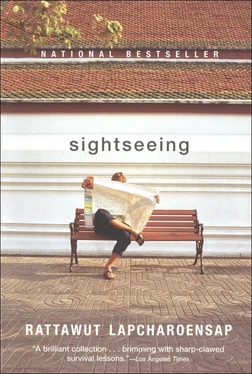One morning, Ma misjudges the last step coming down the stairs, turns her ankles. She steadies herself with a hand on the banister.
“You all right, Ma?” I laugh. She steadies herself, widens her eyes. She blinks twice. She smooths out her dress with both hands, pulls the strap of her purse back onto her shoulder.
“Oh dear,” she says, chuckling. “Don’t know what’s with me these days. Just a little overworked, I guess. Too many things on my mind.”
A few days later, she’s not going to work. She’s home, reclined on the couch, watching television in her pajamas.
“You sick, Ma?”
“It’s just this migraine,” she says, holding a hand to the side of her head. A migraine. Migraines never stopped her before. She’s a woman who doesn’t miss work. Not ever. Not for migraines, not for flus, not for colds. Not for monsoons, not for landslide warnings. Not even for the military’s curfew a few years ago, when the Red Cross carried wounded protestors on bloodied stretchers into the lobby of her office building. She’s a woman who once went to work with malaria and was asked to go home because her boss found her in the bathroom throwing up. Even then, she insisted on going back to work — until she fainted in the middle of a company meeting. An ambulance had to be called; she went back to work the very next day.
“I’m glad you’re taking some time off, Ma. Should I take you to a doctor?”
She smiles at me from the couch, turns back to the television, snuggles up against one of the pillows.
“It’s okay. I already took some medicine. Feeling much better already. Go on ahead to school, luk. Don’t worry about me.”
But two weeks later, there is nothing but worry for both of us. Two weeks later, while I’m downstairs having my breakfast, spooning the last of my rice porridge, I hear a loud crash coming from the upstairs bathroom. I hear the shower trickling, the electric water pump whirring and wheezing in the back of the house, and then there’s another loud thudding, the sound of something heavy hitting the ground. I walk to the bottom of the stairs, call up to my mother. I ask if she’s okay, but there’s just a long unending silence. There’s just the slow, steady trickle of the shower.
I’m up the stairs. I’m at the bathroom door.
“You okay, Ma?”
“Sorry. Just dropped something.”
There’s a weak, sheepish chuckle in her voice and then, as I’m walking back toward the staircase, I hear the sound of skin slipping against porcelain tiles, like a car screeching to a halt. I hear that thudding again, louder this time. It’s like the footsteps of giants. Like fists hitting sandbags. Like my mother hitting the bathroom floor.
The door isn’t locked. It’s as if she knew this would happen, as if she’d left the door unlocked that morning thinking, Just in case. I open the bathroom door. I see my mother’s silhouette through the shower curtains, a small heap on the floor, thick clouds of steam billowing through the room. I walk toward the shower. I throw the curtains open on my mother’s nakedness. I help my mother get up. Her irises roam wildly back and forth across the ceiling. Her small hands reach out for my arms. Her fingernails dig into my flesh. Her mouth opens and closes like a fish out of water, gasping for air.
It is then that the barely noticed details start to fall into place — the clumsiness, the bruises and cuts, the misjudged steps, the misshapen eyebrows, the days off from work. I turn off the shower. I wrap a towel around her small, naked body. I help my mother get up. This is the first time that I have seen my mother naked. I look at the way her breasts sag like upturned bells, nipples bulbous like baby mangosteens. I look at the thick thatch of hair between her legs. I look at that lost look of shame on her face.
My mother is going blind.
The doctors say her eyes have deteriorated beyond repair. Migraine-induced retinal detachment. They tell us that if she had checked in a couple of months earlier, when the migraines started, when the pain behind her eyes began, blindness might have been averted. They tell us it’s too late now. We take the three-hour trip to Bangkok Christian — a private hospital that took care of the prime minister when he lost his right eye in a shooting accident — to get one last opinion.
The ophthalmologist at Bangkok Christian mentions experimental surgery. But he informs us that the success rate has been slim thus far. He says Ma would risk going blind altogether from the procedure. It is something called a “vitrectomy”: taking my mother’s eyes out of their sockets, soldering the fallen retina back to the vitreous, putting them back in again. The ophthalmologist says the procedure will be very expensive. A surgeon would have to be flown in from Singapore. He says this with a smile. His stiff, white lab coat shimmers under the bright fixtures.
“Money’s not an issue, Doctor.” I say this curtly, though I know it is a lie. My mother and I have never purchased a plane ticket for ourselves, let alone for some stranger from Singapore. Ma tells the ophthalmologist we’ll think it over. We leave Bangkok Christian with nothing new. Four doctors now and still the same old story.
Eight to ten weeks before permanent loss of sight. Retinas detached, vitreous shrunken, optic nerves irrevocably damaged. Stay out of the sun. No bright lights. No small print. Do eye exercises. Focus on slowly moving objects. We need to keep the retinas stimulated, on the off chance they might regenerate. On the off chance. In case of a miracle. Get lots of sleep. Don’t go to work. You really can’t go to work, ma’am. But above all, don’t panic. But most important, please relax.
My mother quits her job. Later that week, we look at a map of Thailand together, tracing the hatchet-shaped boundaries, circling places she would like to see. Lop Buri. Chiang Rai. Loie. Samut Songkhram. Mae Hong Son. The doctors tell Ma to get out of the city, take a vacation. We decide to go to the Andaman Islands.
And in my room that week I unpack my belongings once more. I don’t repack them this time. I put all of the books back on the shelf, stack the brand-new notebooks under my desk. I move the course guide, the maps, and the brochures from the head of my bed, stow them away in a drawer. Though I still take them out from time to time, flip through the now-familiar pages, I’m finding it difficult to dream of those mountains again. I cannot look at those maps without imagining my mother blind and alone in the house, and I’m starting to wonder, for the first time in my life, about what kind of son I really am.
The train comes to a stop in Trang. I try to take my mother’s arm when we get up.
“I’m not blind yet, luk.”
“Sorry, I just thought—”
“You just thought nothing, luk. I’m fine.”
The sun is gone, the tree-lined horizon red from the last of its rays. Moths dance against the platform’s flickering lamplights. When we step off the train, Ma puts on her sunglasses: horn-rimmed, purple-rhinestoned Armanis we bought at the Chatuchak Bazaar. She wears those sunglasses every chance she gets now. Doctor’s orders. They suit her well, and if it wasn’t for the fact that sunglasses look out of place in the evenings, I’d say my mother might be a Chinese movie star.
We check into our hotel room, have dinner at a noodle vendor in the center of town. We order large bowls of seafood vermicelli, sit at a small table on the sidewalk. We eat by the weak light of the town’s streetlamps.
“You okay?” Ma asks, tugging at the noodles with her chopsticks, peering over her sunglasses, thin wreaths of steam unfurling between us.
“I’m fine. Why?”
“You’re not being very talkative, that’s all. You’ve been a little morose. A mother notices, you know.”
Читать дальше











